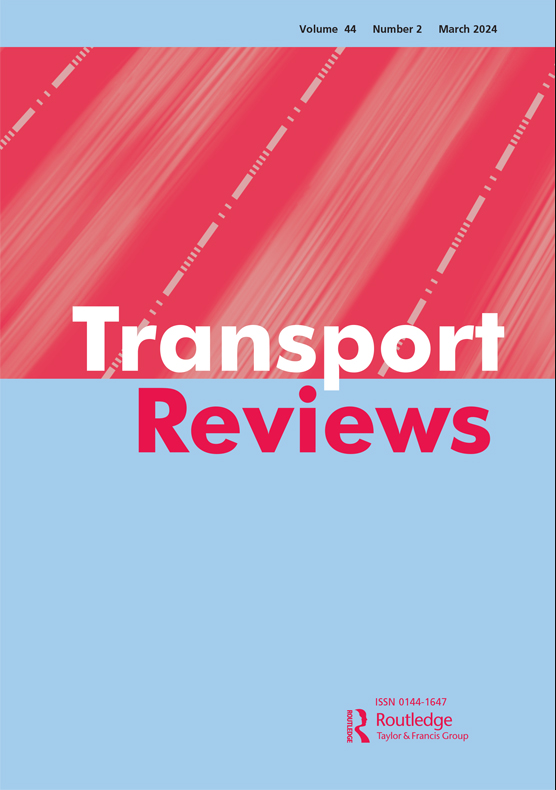Electric vehicle charging disadvantage: a social justice perspective on charging with implications to accessibility
IF 9.9
1区 工程技术
Q1 TRANSPORTATION
引用次数: 0
Abstract
Electric vehicle (EV) charging access is an important component in the transition to electric mobility, yet access disparities exist across user groups, creating distributive, recognition, and procedural justice gaps. In this paper, we introduce the term charging disadvantage, denoting challenges users face in accessing EV charging. We develop a conceptual framework, the EV charging capabilities (EVCC) framework, grounded on the social justice perspective of the capabilities approach, to illustrate the determinants and impacts of charging access, considering both transport and energy contexts. We conducted a literature review to inform the development of this framework. While previous literature extensively studied the impact of charging access on EV adoption, we further explore the effects on users’ travel behaviour, activity scheduling, and accrual of energy-related assets. By shifting the viewpoint of charging access from spatial infrastructure distribution to the provision of capabilities, we can identify the roles of financial capacity, personal conditions, social roles and relationships, physical environment, and wider structural conditions on charging disadvantage and its consequences. The EVCC framework can be applied as a tool to systematically identify users vulnerable to charging disadvantage and to guide the analysis of EV charging policies and practices. Using the same literature review, we demonstrate one of these applications by identifying highly vulnerable groups and providing recommendations to address their vulnerability. We underscore the need for EV charging infrastructure planning and deployment that is user-centred and captures activity and energy access, rather than solely relying on physical proximity to facilitate a just electric mobility transition.
电动汽车充电劣势:充电的社会公正视角与可及性
电动汽车(EV)充电接入是向电动出行过渡的重要组成部分,但用户群体之间存在接入差异,造成了分配、识别和程序公平的差距。本文引入“充电劣势”一词,表示用户在使用电动汽车充电时面临的挑战。基于能力方法的社会正义视角,我们开发了一个概念性框架——电动汽车充电能力(EVCC)框架,以说明充电接入的决定因素和影响,同时考虑到交通和能源环境。我们进行了文献综述,为该框架的发展提供信息。虽然之前的文献广泛研究了充电接入对电动汽车采用的影响,但我们进一步探讨了充电接入对用户出行行为、活动计划和能源相关资产积累的影响。通过将充电接入的视角从空间基础设施分布转向提供能力,我们可以识别出财政能力、个人条件、社会角色和关系、物理环境以及更广泛的结构条件对充电劣势及其后果的作用。EVCC框架可以作为一种工具,系统地识别易受充电劣势影响的用户,并指导电动汽车充电政策和实践的分析。使用相同的文献回顾,我们通过识别高度脆弱的群体并提供解决其脆弱性的建议来展示这些应用之一。我们强调电动汽车充电基础设施的规划和部署需要以用户为中心,捕捉活动和能源获取,而不是仅仅依靠物理距离来促进电动汽车的过渡。
本文章由计算机程序翻译,如有差异,请以英文原文为准。
求助全文
约1分钟内获得全文
求助全文
来源期刊

Transport Reviews
TRANSPORTATION-
CiteScore
17.70
自引率
1.00%
发文量
32
期刊介绍:
Transport Reviews is an international journal that comprehensively covers all aspects of transportation. It offers authoritative and current research-based reviews on transportation-related topics, catering to a knowledgeable audience while also being accessible to a wide readership.
Encouraging submissions from diverse disciplinary perspectives such as economics and engineering, as well as various subject areas like social issues and the environment, Transport Reviews welcomes contributions employing different methodological approaches, including modeling, qualitative methods, or mixed-methods. The reviews typically introduce new methodologies, analyses, innovative viewpoints, and original data, although they are not limited to research-based content.
 求助内容:
求助内容: 应助结果提醒方式:
应助结果提醒方式:


